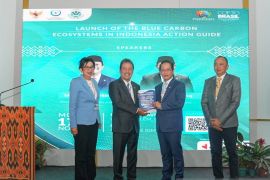To anticipate climate change, it is necessary to implement the CSA program in IndonesiaJakarta (ANTARA) - The Ministry of Agriculture is developing a Climate-Smart Agriculture (CSA) program to anticipate climate change and minimize its impact on national food production.
Head of Agriculture Councelling Center of the Agriculture Ministry Leli Nuryati said that global climate change has become one of the challenges to developing the agricultural sector in the country.
"To anticipate climate change, it is necessary to implement the CSA program in Indonesia," Nuryati stated during a webinar on 'Climate-Smart Agriculture for Sustainable Agriculture and Supporting Food Security' on Thursday.
CSA envisages strategic development of modern agriculture based on environmentally friendly technologies and intelligent use of natural resources, especially water, she added.
Therefore, with the CSA program, farmers are expected to take advantage of information technology or Internet technology for cultivation, she said.
Nuryati said her department has implemented a pattern of dissemination or information dissemination regarding agricultural development, online education, and training for farmers to equip them with climate-smart agriculture-based technologies.
The CSA technologies that can be applied by farmers consist of the use of high-quality and low-emission seeds, use of organic materials, balanced use of fertilizers, control of plant pest organisms (OPT) in rice, and measurement of greenhouse gas emissions.
"We will provide advisors to teach farmers regarding this CSA program," she informed.
In addition, the Agriculture Ministry has also carried out another strategy to develop the CSA program by supporting millennial farmers whose number is expected to reach 2.5 million by 2024, Nuryati said.
"Millennial farmers are encouraged to become young entrepreneurs in the agricultural sector," she added.
During Thursday’s webinar, a book titled Indonesian Climate Smart Agriculture: Concepts and Technology was also launched by Yiyi Sulaeman.
Sulaeman said the benefits of implementing climate-smart agriculture include an increase in agricultural output, reduction in negative impacts on the environment, optimal use of land and resources, and building of resilience to climate change.
Related news: B20 invites global corporations to create recommendations for G20
Related news: Indonesia must urge developed nations to disburse climate change fund
Related news: Indonesia experiencing impact of climate change: BMKG
Translator: Subagyo, Resinta Sulistiyandar
Editor: Sri Haryati
Copyright © ANTARA 2022












